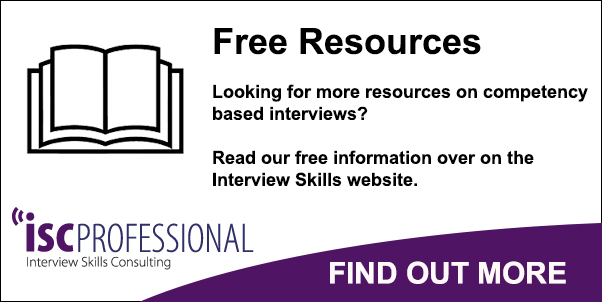Competencies and Skills Tested in Competency-Based Interviews
Competency-based interviews give employers a chance to accurately assess a candidate’s potential occupational performance by testing their skills and attitude in a work focused context.
One of the keys to acing this part of the recruitment process is anticipating the specific skills and competencies which are likely to be tested. Here we examine the specifics of skills and competencies in the structured interview.

Competency overview
While the competency-based approach is used widely, its application is very much tailored to the specifics of the job being recruited for. For entry level administrative appointments for example, the focus is likely to be on communication, teamwork and time management skills.
Competency-based interviews for managerial posts will understandably also incorporate questions dealing with leadership, influencing skills and risk taking. Adapting your answers to reflect the level of responsibility associated with the job you want to get is an important part of preparing for a competency-based interview.
Competencies- the specifics
The most common skills and competencies which candidates are asked to demonstrate at interview fall into five broad categories-personal competencies, interpersonal competencies, people/organisational competencies, analytical competencies, and motivational competencies. We will consider each of these in turn:
Personal competencies
These competencies relate to the personal skills and attributes a candidate needs to manage their own performance. Common examples include autonomy, flexibility, tenacity and decisiveness.
Candidates may be asked to describe a situation where they had to make an important decision without consulting their manager or to give an example of a time when they had to overcome a significant setback.
Interpersonal competencies
Questions on these competencies are designed to get to the heart of how a candidate works as part of a team. The key competencies being assessed include collaboration, sensitivity to others, influencing and team work.
Questions are likely to focus on how you achieve and maintain positive working relationships with colleagues or how you resolve conflict with co-workers.
People/organisational competencies
This category deals with your ability to lead and to operate strategically. Skills and attributes around leadership, empowerment, organisational and external awareness are what the panel want to test here.
Expect to be asked about your powers of persuasion and influence, team management issues and for examples of when you have approached a task from a broader, strategic perspective.
Analytical competencies
These competencies deal with your ability to manage problems and situations as well as your ability to develop innovative approaches to particular issues.
The competencies being tested include reasoning skills, practical learning, creativity and adaptability. Candidates may be asked to describe a situation where they had to find a new approach to solving a problem or to adapt their approach to meet the needs of a changing situation.
Motivational competencies
Employers want candidates who can perform under pressure, no matter what barriers to success they may encounter. They use competency-based questions to test prospective employees’ attitude to getting the job done, achieving goals, using their initiative and motivating themselves and colleagues.
They are also keen to gain an insight into your commitment to maintaining standards and to consistently meeting customer and client needs. Question areas often include asking for examples of when you had to meet a challenging target or when you had to go ‘the extra mile’ to achieve your goals.
Whatever job you are being interviewed for, it is important to take the time to become familiar with these competencies and to develop solid examples of when you have demonstrated them. For more advice on preparing for competency-based interviews contact the experts at Interview Skills Consulting.

